Visiting the Centre
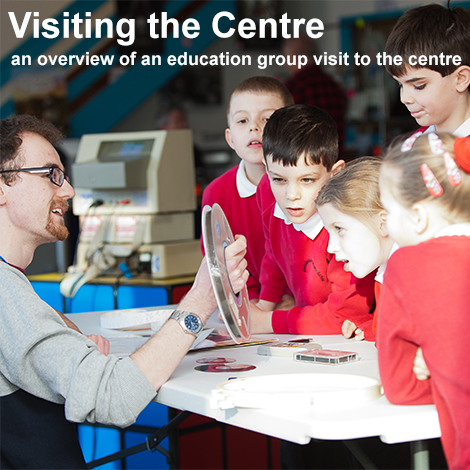 |
"Our new displays and activities are designed to support the teaching of Computing in the Curriculum and much more."
Dr Anjali Das, Head of Learning at The Centre for Computing History |
|
|
This section will provide you with information about:
|
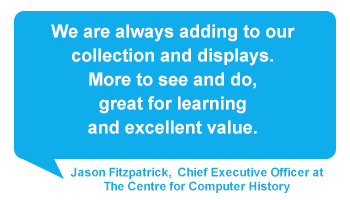 |
|
Exploring the past, present and future |
||
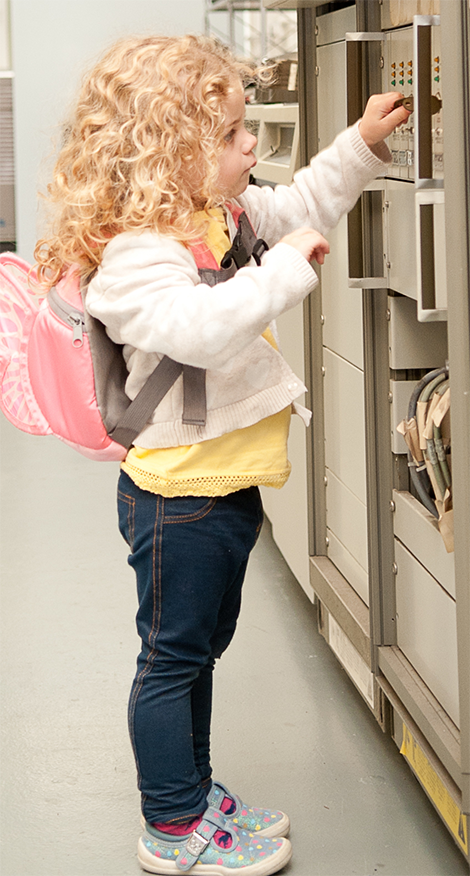 Time travelers start young at the Centre for Computing History. Time travelers start young at the Centre for Computing History. Whatever their age, young people are welcome to visit the Centre and explore our computing past. A hands-on learning experience wrapped up in a historical context, offers young people an insight into the computing curriculum beyond classroom-based learning.
The Centre welcomes visits from Community and Foundation schools, Academies and Grammar Schools, Special schools and Independent schools, FE Colleges, Universities and all organisations supporting the education of young people. More than a museum, the Centre;
Ofsted recognises that museum visits and learning outside the classroom improve the quality and depth of students’ learning and considers it essential to offering young people an outstanding broad and balanced curriculum. Ref: Learning outside the classroom: How far should you go?, Ofsted (2008). Why visit the Centre for Computing History? |
'inspirational' |
|
|
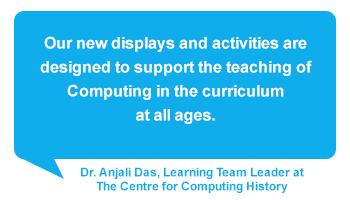 |
|
|
What games were mum and dad playing when they were young and what has led computer games to become the major worldwide industry that it is today? In this exciting presentation students will explore the development of games consoles, learn about game design, mechanics and narrative and witness the development of graphics from 8-bit to HD. The gallery hosting the history of computing and games zone is an amazing resource for learning, but your visit does not end there. |
'a hands-on learning experience' | |
|
|
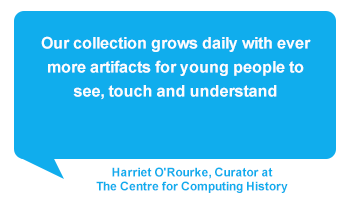 |
|
| The Megaprocessor is an amazing construction and is a computer processor made large - very very large! The Megaprocessor helps us answer a very important question: What is a computer? In this zone of the museum young people will find out more about the Megaprocessor and explore a range of other activities to support their day, time travelling through computer technology. Want to know more about the Megaprocessor then click here. | 'highly motivating' | |
|
Taking place in our 80s classroom, in small groups, the young people can program a Raspberry Pi to control a device through to coding an 80s BBC Microcomputer. The choice of workshop for your students is made when you book your visit. Click on the image to the right to find out more about the workshops on offer as part of your visit.We warmly welcome any contribution made by you and your colleagues as your students visit each zone. We need your help to ensure every student gains as much as they can from their visit to the Centre. Please ask questions, raise points of interest, direct students and gather information for yourself. |
 |
|
|
Outside a normal classroom environment, the students’ experience at the Centre will motivate them and broaden their horizons enabling them to develop new skills and build relationships. |
'brings history to life' | |
How long should we stay?
Depending upon the size of your group we would recommend that your visit to the Centre should be between 3 and 5 hours duration. This is to ensure that all students can experience the workshop which runs for a minimum of one hour and can accommodate a maximum of 15 students per session. Most visiting groups arrive between 10.00am - 11.30am and depart between 2.30pm - 3.30pm. Group bookings are accepted, arranged and charged on the basis of their size. You can find out more about group sizes, times and charging by checking out the 'Book your visit' section. |
'learning a new skill' | |
Who at the Centre will work with our students?The majority of education group visits to The Centre for Computing History are led and supported by Dr Anjali Das, our Head of Learning. She will call upon extra help from staff and volunteers with particular specialisms, that make up the Education Team. All Centre staff and volunteers that have direct contact with young people have been cleared via the Disclosure and Barring Service (DBS). Centre staff and volunteers do not act on behalf of your organisation's supervising adults. We require all visiting groups to include the required number of supervising adults. At least one adult from the visiting organisation must be present with each subset of the students as they move around the Centre. The behaviour of the students is the responsibility of the visiting organisations' supervising adults at all times. |
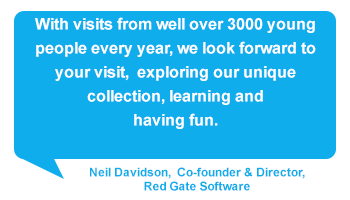 |
|
What age range is best served by a visit?The Centre for Computing History is pleased to host visits across a wide range of ages and ability. With a clear benefit to the Computing curriculum, a visit can also support Science, Technology, Engineering, and Maths (STEM). We also have much to offer students and teachers in other subjects and disciplines such as Science, History, English, Art, Design Technology, Mathematics and of course literacy and numeracy. We have hosted visits (for example) from groups who have included;
The Centre is happy to support a pre-visit by the organising teacher to agree the detail of the programme for their visiting group. |
'problem-solving skills, independence and confidence' | |
Explore our Learning section of the websiteA visit to the Centre by you and your students will offer a perspective of the fascinating and often surprising connections between past innovations, people and stories, and the technologies that permeate our lives today. We have tried to provide as much information as possible to help you plan for your visit. You will find more information by clicking on:
|
'raises achievement' | |

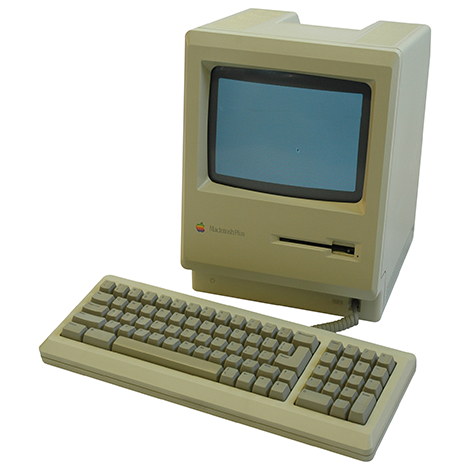 What will a group experience?
What will a group experience?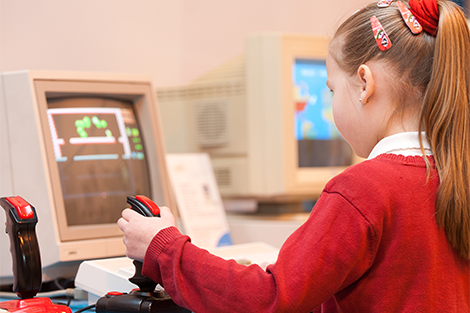 Even computer games have a history and our young visitors always enjoy a visit to the Centre's games zone.
Even computer games have a history and our young visitors always enjoy a visit to the Centre's games zone.
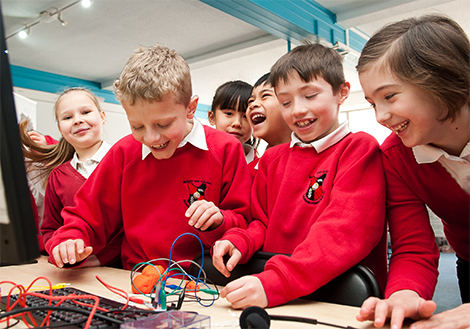
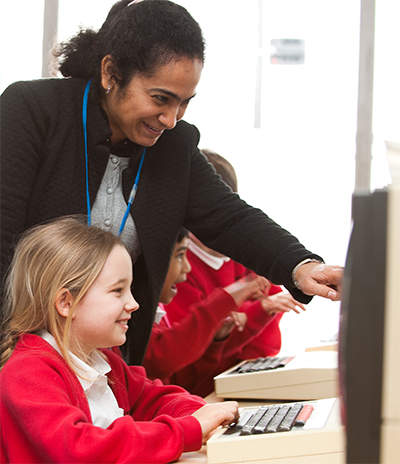 Your students' visit to The Centre for Computing History is a journey through; the computing timeline, computer games, megaprocessor and the workshop and offers our young visitors a unique and varied experience in four zones.
Your students' visit to The Centre for Computing History is a journey through; the computing timeline, computer games, megaprocessor and the workshop and offers our young visitors a unique and varied experience in four zones.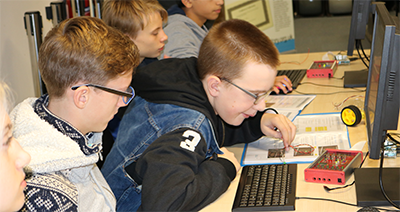 Visiting groups are often broken down into smaller sets of no more than 15 students. These smaller sets rotate around the Centre's zones ensuring a good quality experience for the students and the best use of our resources and collection.
Visiting groups are often broken down into smaller sets of no more than 15 students. These smaller sets rotate around the Centre's zones ensuring a good quality experience for the students and the best use of our resources and collection.







